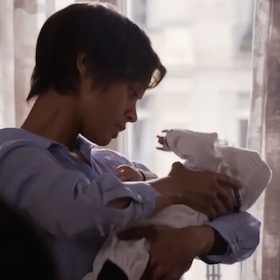'Rosemary's Baby' Night Two Review: An Unoriginal Script Provides No Scares, No Surprises

1/5
At no point does NBC's Rosemary's Baby justify its length, especially since it offered no new or unique view of the original story, deciding rather simply to go through the motions with different actors. Instead, the four-hour event managed only to show us why the original movie was successful: at the very least it was economical with its time.
Patrick J. Adams’ Guy Woodhouse is a particular victim in this tragedy of a remake. His character has even less to do in this chapter than the last, succumbing to the cult’s temptations off-screen. On screen, he involves himself not only with the murder of his former lover and friend Julie (Christina Cole), but also in the deception of a wife he suddenly no longer loves and allows himself to be cuckolded by the Devil. (To be fair though, I too would probably sell my soul for a book deal.)
By leaving Guy’s transformation off screen we’re robbed of what could have been a solid moment of Guy not only becoming aware that he is essentially being offered everything he has ever wanted but also that he is given proof of the supernatural’s existence as well as the existence of the Devil himself. That sort of thing, I would imagine, would have quite the singular effect on a person, and would help set this miniseries apart from the original movie which also made the same mistake with Guy’s character. The move for Guy to become a villain tends to make less sense in the miniseries since so much time was devoted in “Night One” to showing us how much he and Rosemary loved each other. Instead, Guy’s shift is too sudden and jarring, belonging more to yet another Lifetime/WE channel men-are-evil TV movies than anything else.
The Castevets (Jason Isaacs and Carole Bouquet) are given more screen time in “Night Two” which is definitely a saving grace. They have at this point gone far from subtlety and are more overt in their evil, which is a move that is both necessary and gives the plot at least some sense of movement. A standout moment, few that there were, was Rosemary announcing the child was a boy. Isaac’s Roman reacts with a relieved joy and is moved to tears. It’s a tender and lovely moment made truly scary when knowing how happy he is at the Antichrist’s impending birth.
The scares ended there of course, and the screenplay again resorts to simple gore to keep our attention between the dull exposition and first draft dialogue that must have been as embarrassing for the actors to say as it was for the audience to watch. Rosemary’s Baby is a vehicle for Rosemary herself and Zoe Saldana, again, does her best with what she’s given, though this likely won’t quiet any of her detractors.
Not to get too far off topic, but having Rosemary cut her hair—Hollywood’s way of telling us she’s ready to be a mom—and styling it to resemble Mia Farrow’s look isn’t a reference to the original film from Roman Polanski, it’s a reminder of the movie that we aren’t watching.
By the time of the final act, the boredom is great. Here was yet another opportunity for the miniseries to set itself apart from its source material. Sure, it was already too late, but at least there would be something of a surprise. Rosemary, knife in hand, confronts the coven of witches and her estranged husband (he’s growing facial hair, definitely means evil), and finally meets her offspring. The original movie ends with Farrow’ Rosemary placing a hand on the child and slightly smirking, succumbing to her own temptation of motherhood. However, here, Saldana’s Rosemary is wielding kitchen cutlery and threatening everyone. This would have been the moment: Rosemary, fighting her motherly instincts with the truth that her child is, you know, evil, and kills him to save the world. It would have been different than what we saw in the novel and the Polanski adaptation. Rosemary pulls the knife up over her head (which happens only in fiction) and is about to plunge the blade down when she is stopped and the knife falls, the point digging into the floor so it’s standing (again, only in fiction).
Like in the previous versions, Rosemary warms to her son, Adrian, and in a laughable moment is immediately trusted by the entire cult to not only hold her child, but to feed him alone in a room. Again, here is the moment writers James Wong and Scott Abbott could have set their screenplay apart by having Rosemary quietly suffocating and breaking the neck of the child—hell, the knife is still in play too! Instead, she doesn’t. The miniseries ends with Rosemary deciding her baby is perfect and happily raises the Antichrist.
Now, I know television generally doesn’t like to kill kids, let alone newborns, but it’s not like it actually had to be seen. A perfect ending would have been for the solitary Rosemary, her baby in her arms, to regard it uncertainly, and hug it. She begins to cry as her hand cradles the back of his head, the screen goes black and we hear a snap. While this ending would not have exactly made the previous three hours and fifty-nine minutes worth it, we still would have been treated to something different; everybody involved could at least sign their names to a different ending, rather than an updated retread.
The credits role and the audience ponders the same two questions we had at the end of “Night One”: “Why was this made?” and “They cancelled Community for this?”
RELATED ARTICLES
Get the most-revealing celebrity conversations with the uInterview podcast!





Leave a comment